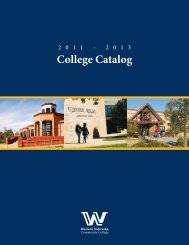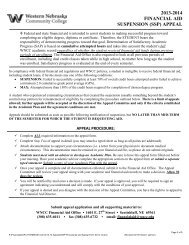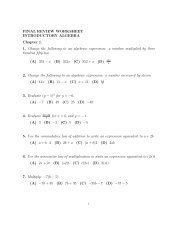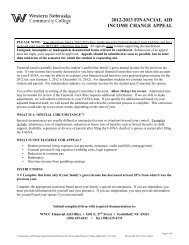WNCC 2010 Self-Study Report - Western Nebraska Community ...
WNCC 2010 Self-Study Report - Western Nebraska Community ...
WNCC 2010 Self-Study Report - Western Nebraska Community ...
You also want an ePaper? Increase the reach of your titles
YUMPU automatically turns print PDFs into web optimized ePapers that Google loves.
The original designations were built on the assumption that courses like nursing, information<br />
technology, and most other career or vocational two-year, terminal-degree offerings required extra<br />
equipment. Similarly, “heavy vocational” courses like automotive technology and industrial or<br />
manufacturing areas receive a 2.0 rating, meaning that funding is doubled to support these classes<br />
which require very expensive equipment to operate, especially with the need to maintain currency<br />
in the curriculum and to provide up-to-date training.<br />
Another community college, Metropolitan <strong>Community</strong> College (Metro) based in Omaha, has<br />
expressed serious concerns with the funding system and has subsequently withdrawn from the<br />
<strong>Nebraska</strong> <strong>Community</strong> College Association. Its Board is trying to prompt legislative action to<br />
prevent the implementation of the new formula and to revise the current funding structure.<br />
This has complicated the situation for the other five colleges, introducing one more note of<br />
uncertainty about budgeting and resources, further accentuating problems in planning for the<br />
future. Short-term operating budgets are unpredictable, and long-term planning for facilities or<br />
expansion is equally affected.<br />
Board members and administrators at Metro appear to object to three aspects of the formula:<br />
1. The categorization of all general education and transfer courses in category 1<br />
2. The shift to REU’s as a basis for state aid<br />
3. The burden of developmental education, which is also included in the rating of 1 for<br />
funding calculation.<br />
Since transfer courses count as only a 1 in calculations, the funding remains static, while<br />
vocational course offerings with higher conversion rates gain a larger share of the funding pool<br />
dollars. Particularly, Metro officials argue that nearly all of the science classes require laboratory<br />
sections which involve expensive equipment and a greater teacher load because the increased<br />
contact hours for instructors during labs. Thus, more teaching load credit is accrued by the<br />
instructors, increasing instructional cost and decreasing instructor availability to offer other<br />
sections. Complicating this further are issues relating to lab sizes, which are normally restricted<br />
because of safety and oversight concerns to as few as 8 students up to a usual total of about 12.<br />
This means that often 2 or 3 lab sessions must be offered for each theory course in cases like<br />
earth or life sciences, chemistry, engineering, and physics.<br />
Technology-intensive course offerings require institutional support beyond classrooms normally<br />
used for courses like English or even mathematics, according to Metro officials. Again, these<br />
points are also applicable to <strong>WNCC</strong>, although <strong>WNCC</strong> has chosen not to protest the funding plan<br />
implementation. <strong>WNCC</strong> officials and all the other college leaders signed the agreement and<br />
understood the ramifications of a system built upon some degree of compromise for all six entities<br />
(the six community colleges in <strong>Nebraska</strong>) in order to create a fair and reliable system of allocation.<br />
The previously mentioned conversion to REU’s for calculation of state aid through the funding<br />
formula favors vocational education in general. <strong>WNCC</strong> and Metro both offer significant proportions<br />
of transfer education (normally around 50-60% for <strong>WNCC</strong> across various academic years). Those<br />
colleges which are more oriented toward being technical institutes will benefit, while <strong>WNCC</strong> and<br />
Metro will lose funds in the process. An obvious strategy is to increase career training<br />
Page 76<br />
<strong>Western</strong> <strong>Nebraska</strong> <strong>Community</strong> College









